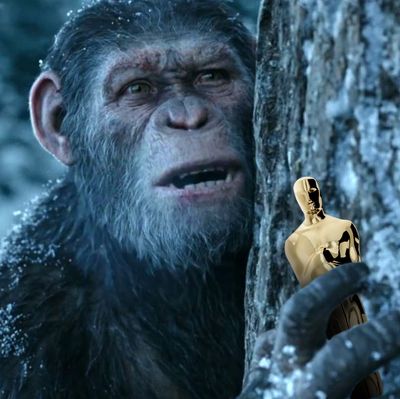
In 2011, Rise of the Planet of the Apes was hailed as a special-effects landmark for the motion-capture work Andy Serkis did to portray Caesar, a super-intelligent chimpanzee and reluctant revolutionary. In 2014, the rebooted series doubled down on its achievement with Dawn of the Planet of the Apes, which brought an entire ape civilization to life with such technological skill that the seams never showed. Throughout this franchise and into the newest installment, War for the Planet of the Apes, the effects never served simply as spectacle, though plenty of that was on display; rather, the full power of computer-aided graphics was put to use to heighten the emotion and empathy of its performances. They’re a wowser in every way.
So why hasn’t this series won a damn Visual Effects Oscar yet?
For a trilogy destined to be remembered for its incredibly deft advancements in the field of motion-capture acting, the new Apes movies have had no luck convincing the Academy to give up the gold. Rise lost the Visual Effects Oscar to Martin Scorsese’s Hugo, which nabbed five tech Oscars that year. More recently, Dawn fell in the Visual Effects category to Christopher Nolan’s outer-space saga Interstellar. If you include the original movies, the Apes franchise has never won an Oscar; the only hardware it has ever taken home from this group is an honorary Academy Award given to 1968 series starter Planet of the Apes for its makeup.
Can War for the Planet of the Apes do what the previous movies have not and take home that Visual Effects trophy? Certainly, it’s a worthy work. While it can’t offer the same staggering leap forward that Rise and Dawn represented, War is a refinement of the those technological advancements. Confident in its ape designs and the audience’s willingness to invest in them, it spends far less time with the human characters than the previous two movies did, and it pushes the apes out of their camouflaged forest home and into a series of new settings that offer different effects challenges (and a whole lot of inclement weather). The results are never less than wholly convincing.
Still, the Academy is awfully resistant to sequels winning in this category. The last one to triumph here was 2004’s Spider-Man 2, so expect War for the Planet of the Apes to get no discernible bump from the fact that it’s been designed as a series-capper. The Harry Potter franchise also came up empty-handed in the Visual Effects category throughout its run, and while the final film, Harry Potter and the Deathly Hallows — Part 2, was sold as the last opportunity to reward the entire series for its work, it came out the same year as Rise of the Planet of the Apes and was yet another also-ran to Hugo.
Part of the reason that Hugo proved so formidable is that it was a Best Picture nominee: Visual-effects contenders that are honored there (like Gravity, Life of Pi, Inception, and Avatar) or just barely missed the Best Picture cut (like Ex Machina and Interstellar) almost always have the edge for the effects Oscar. Fox will most definitely give the well-reviewed War for the Planet of the Apes a Best Picture push, but that category is even more hostile to sequels. The only such movies to be nominated for Best Picture over the last decade were Toy Story 3, an animated film, and Mad Max: Fury Road, which was for all intents and purposes a reboot.
It’s true that in the visual-effects category, War for the Planet of the Apes will likely be facing a host of other sequels like Guardians of the Galaxy Vol. 2 and Blade Runner 2049, but that’s why I think an original work may have the edge here. There are two coming soon from Academy-approved filmmakers — Nolan’s war movie Dunkirk and the effects-laden Downsizing from Alexander Payne — that will offer sequel-sick Academy voters a fresher option. When it comes to competitive Oscars, then, War for the Planet of the Apes has its work cut out for it.
That’s why I think the best chance for the movie to take home an Academy Award will be an honorary Oscar akin to the one given to the original 1968 film. For each of the new Apes movies, Fox has touted Serkis as a potential acting nominee, but the actors’ branch has not bitten. I can’t see Serkis making a dent in what is likely to be a formidable, veteran-stacked Best Actor lineup this year, but after his pioneering motion-capture work in the Apes franchise and Peter Jackson’s Lord of the Rings trilogy, it would be outrageous for Serkis to never get his due. I expect he’ll be given an honorary Oscar sooner or later, and it would be a proper tribute to the Apes movies and what he has accomplished with them if it came this year. We’ll see what the Academy decides, but expect the drumbeat for Serkis to be constant.

